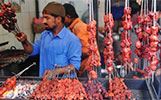| US Meat Groups Fear China Beef Tariff Hike Risks Market Growth
Theopolis Waters, Successful Farming | April 4, 2018
China's proposal on Wednesday for tariffs on U.S. beef confirmed the worst–case scenario for the U.S. cattle industry, trade groups said on Wednesday, even as they remained hopeful the dispute could be resolved quickly.
China listed U.S. goods from soybeans to beef that could potentially incur a 25% import tariff by the end of May if Washington carries out its threat to raise similar duties on $50 billion in Chinese goods.
New Investment Fund Launched Dedicated to Innovative Animal Health, Nutrition 
Feedstuffs | March 21, 2018
Seventure Partners, one of Europe's leaders in financing innovation and a world leader in Life science microbiome investment, announced that it has launched AVF, the innovative venture capital fund, targeted at supporting companies in the field of animal health, feed and nutrition.
The rapidly growing world population and the increased demand from emerging countries for animal protein present significant challenges to the sector as well as the requirement to meet environmental objectives and for sustainable production within the livestock industry.
The Myth of the Indian Vegetarian Nation 
Soutik Biswas, BBC News, India | April 4, 2018
What are the most common myths and stereotypes about what Indians eat? The biggest myth, of course, is that India is a largely vegetarian country.
But that's not the case at all. Past "non–serious" estimates have suggested that more than a third of Indians ate vegetarian food. If you go by three large–scale government surveys, 23%–37% of Indians are estimated to be vegetarian. By itself this is nothing remarkably revelatory.
But new research by US–based anthropologist Balmurli Natrajan and India–based economist Suraj Jacob, points to a heap of evidence that even these are inflated estimations because of "cultural and political pressures". So people under–report eating meat – particularly beef – and over–report eating vegetarian food.
Taking all this into account, say the researchers, only about 20% of Indians are actually vegetarian – much lower than common claims and stereotypes suggest.
You may have read the TIME article on the reaction of the beef industry to alternative meats; the one below from Dan Murphy is an industry commentators view on why a knee jerk negative reaction is not desirable. As far as GRSB is concerned, alternative proteins fall outside of our purview, we are focusing on making production of real beef, wherever that may be, more sustainable, and we know that doing so will be beneficial for people, profit, planet and animals. It will be up to the alternatives to prove their worth in their own market; we should focus on the market for real sustainable beef.
Murphy: A Bad Reaction 
Dan Murphy, Drovers | March 21, 2018
Unfortunately, reactionary is an accurate description of the position of many people in the meat industry regarding the emergence of the alt–meat sector and the marketing of a number of plant–based "meat" products aimed at a segment of affluent consumers concerned (mainly) about the eco–impact of animal agriculture.
There is coordinated, often strident opposition to the media's coverage of this new sector, condemnation of the companies responsible for launching these new products and even demonization of the technology itself.
None of that is any good for the industry, from either a business standpoint or a public relations perspective. Rather than reacting to the popularity and publicity accorded these non–meat analogs, it's far better to start figuring out better messaging for the 80–plus percent of the population that still does — and will continue to — consume real meat.
Why Africa's Free–trade Area Offers So Much Promise 
Landry Signe, Business Day | March 31, 2018
African leaders have just signed a framework establishing the African Continental Free Trade Area (AfCFTA), the largest free–trade agreement since the creation of the World Trade Organisation (WTO).
The free–trade area aims to create a single market for goods and services in Africa. By 2030 the market size is expected to include 1.7–billion people with more than $6.7–trillion of cumulative consumer and business spending — that is if all African countries have joined the free–trade area by then. Ten countries, including SA and Nigeria, have yet to sign up.
The goal is to create a single continental market for goods and services, with free movement of business persons and investments.
From Carbon To Feral Donkeys, Northern Cattlemen Tell It How It Is 
Shan Goodwin, Queensland Country Life | March 23, 2018
It was a tale of social, political and environmental ironies having huge impacts on the global competitiveness of the northern pastoralist that colourful grazier Tom Stockwell fashioned as his final word in the role of Northern Territory Cattlemen's Association president. From carbon sequestration to research on feral donkey genetics, Mr Stockwell listed a host of conflicting realities posing significant risk to the northern beef producer's tenure and productivity.
"The northern beef industry has borne the cost of Australia's commitment to the Kyoto Protocol and we now know that we have a positive sequestration story to tell, and a significant sustainability issue if we do not control woody regrowth and allow sensible planned clearing as a management response," Mr Stockwell said
Survey Says Beef Producers Give Cautious Support to Traceability
Nevil Speer, BEEF Magazine | April 5, 2018
The National Cattlemen's Beef Association (NCBA) Beef Industry Long Range Plan (2016–2020) includes the strategic objective to, "Conduct a feasibility study to understand the economic opportunity of opening new and expanding markets, and the lost opportunity in the event of an animal disease outbreak."
That's an important initiative that resulted in new report released at NCBA's 2018 Annual Convention in Phoenix: U.S. Beef Identification and Traceability Systems: Opportunities, Obstacles and Incentives Across the Value Chain (PDF). The comprehensive study, performed by World Perspectives, includes literature review, economic analyses, industry surveys and qualitative interviews. | |
